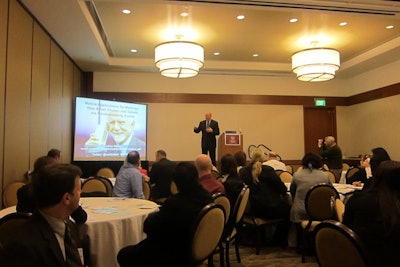
Planners often use surveys to get an understanding of what their attendees liked and didn’t like about their events. But all surveys are not created equal. Christopher Korody is a partner with Audience Metrix, a market research and consulting firm that works with clients such as SAP to evaluate the effectiveness of events.
“I believe that an event is a hugely valuable corporate asset,” Korody says. "It is a communications channel to a very important audience. They are committed to your company, they are willing to spend time with you. The purpose of gathering research and information is to ensure the event continues to be relevant to your audience, that it continues to deliver value, that it continues to address their needs and interests."
Here are his thoughts on how to gather meaningful data that can be used to improve future experiences.
1. A few days before the event, evaluate what potential attendees think about your brand, your products, and whether they view you as a leader in your field. “Traditionally this is done with a one-to-five scale. But you also want to have a few open-ended questions early on, because if they are unhappy about something, they’ll want to vent. And you want them to vent. Because if they don’t have that chance, they will exit the survey,” Korody says.
2. Identify their primary goals for coming to your event. “I believe we are seeing a shift. People don’t have to go to an event to get the content anymore. They just have to log in online. People are coming to network,” Korody says. "If the way people are using events is changing, then the event planner has to change to reflect the new reality." He suggests asking questions to determine if people are most interested in attending sessions, talking to peers, talking to executives, attending the trade show, etc.
3. At the event’s conclusion, conduct a second survey asking the same questions about brand and product perception, such as: Has your opinion of my brand improved? Have I demonstrated leadership in our market category? “If they had this position on the company before they came, and they have this one after they left, that is the event effect. That was the event that moved that needle,” Korody says.
4. Also ask what they actually did at the event to learn whether attendees spent their time in the way they thought they would. Another question to ask: What do you wish you had more time to do?
5. Condense the section about the attendee experience, such as opinions of the food, the venue, the registration process, and transportation, into a few brief questions. “This is historical data, and my theory is those things are very important to the people responsible for the event, but it’s really not useful going forward. Knowing the shrimp was good and the room was beautiful doesn’t really help you,” Korody says. "It’s just a record of what happened on that day."
6. Create questions that can determine whether the attendee found the event valuable. Possible questions include: Have I delivered the content you want in the way you wanted it? Was it organized in a way that you could find what you need? Have I made good use of your time? “If the customer doesn’t get value from the event, the customer ceases to come,” Korody says. “And the value of creating the event is to have dialogue with the customer. It’s not to serve good food.”
7. For events with multiple sessions and speakers, use individual session surveys to determine if the speaker was effective and the content was meaningful. “Did the description match the content you received? That’s a big deal,” Korody says. "You see this constantly: the description was wrong, it was too basic, it was too that. Now they are 15 minutes in and they have to get up and try to get to another session, and it has basically blown their hour."
8. Pay attention to the extreme. “I am looking for the outliers,” Korody says. "I don’t care about the average. It just presents the good news. I’m looking for the huge number of people who loved this thing or the huge number who took time to complain about it."



















